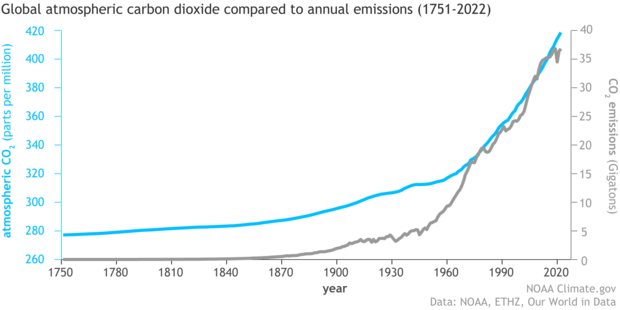

User Controls
Trees and land absorbed almost no CO2 last year. Is nature’s carbon sink failing? | The sudden collapse of carbon sinks was not factored into climate models – and could rapidly accelerate global heating
-
2024-10-15 at 4:40 PM UTC
-
2024-10-15 at 5:29 PM UTChttps://arxiv.org/pdf/2407.12447
Abstract
In 2023, the CO2 growth rate was 3.37 ± 0.11 ppm at Mauna Loa, 86% above the previous year,
and hitting a record high since observations began in 1958[1], while global fossil fuel CO2
emissions only increased by 0.6 ± 0.5%[2,3]. This implies an unprecedented weakening of land
and ocean sinks, and raises the question of where and why this reduction happened. Here we
show a global net land CO2 sink of 0.44 ± 0.21 GtC yr-1, the weakest since 2003. We used
dynamic global vegetation models, satellites fire emissions, an atmospheric inversion based on
OCO-2 measurements, and emulators of ocean biogeochemical and data driven models to
deliver a fast-track carbon budget in 2023. Those models ensured consistency with previous
carbon budgets[2]. Regional flux anomalies from 2015-2022 are consistent between top-down
and bottom-up approaches, with the largest abnormal carbon loss in the Amazon during the
drought in the second half of 2023 (0.31 ± 0.19 GtC yr-1), extreme fire emissions of 0.58 ± 0.10
GtC yr-1 in Canada and a loss in South-East Asia (0.13± 0.12 GtC yr-1). Since 2015, land CO2
uptake north of 20°N declined by half to 1.13 ± 0.24 GtC yr-1 in 2023. Meanwhile, the tropics
recovered from the 2015-16 El Niño carbon loss, gained carbon during the La Niña years
(2020-2023), then switched to a carbon loss during the 2023 El Niño (0.56 ± 0.23 GtC yr-1). The
ocean sink was stronger than normal in the equatorial eastern Pacific due to reduced upwelling
from La Niña's retreat in early 2023 and the development of El Niño later[4]. Land regions
exposed to extreme heat in 2023 contributed a gross carbon loss of 1.73 GtC yr-1, indicating that
record warming in 2023 had a strong negative impact on the capacity of terrestrial ecosystems
to mitigate climate change -
2024-10-15 at 5:31 PM UTCLeft wing climate tards before a hurricane: Man can change the weather!
Left wing climate tards after a hurricane: Man can't change the weather! -
2024-10-15 at 5:34 PM UTC
-
2024-10-15 at 6:02 PM UTC
-
2024-10-15 at 6:12 PM UTC
-
2024-10-15 at 6:24 PM UTCThey start with desired conclusion, then reverse engineer the lies to suit.
-
2024-10-15 at 6:39 PM UTC
-
2024-10-15 at 6:41 PM UTC
-
2024-10-15 at 7:51 PM UTC
-
2024-10-15 at 7:53 PM UTC
-
2024-10-15 at 8:19 PM UTCGiven the occurrence of record breaking temperatures in 2023, we finally analyzed the carbon flux
anomalies over all grid cells, grouped per percentile intervals of temperature anomalies from the
reference period 1991-2020. The results shown in Fig. 3 indicate that extremely hot grid cells (above
the 95th percentile) altogether contributed a gross carbon loss of -1.73 GtC yr-1 over the globe,
including -0.27 GtC yr-1 in the northern mid latitudes (20-60° N) and -1.36 GtC yr-1 over the Tropics
(20°S - 20°N). The 95th hottest grid cells account for 29.57% of the global gross carbon loss and have
no gross carbon sink in 2023, although they cover only 8.61% of the global land area, showing the
disproportionate impact of extremely hot temperatures on negating carbon uptake by the land
vegetation.
This result is alarming as temperatures continue to keep very high values in 2024. It is too early to
conclude on a durable collapse of the land sink in the aftermath of 2023. Yet, forests burned in Canada
will not completely restore their carbon stocks for the next decades, given that it takes about 100 years
for boral trees to recover their initial biomass[31]. Forests in the wet tropics have proven vulnerable to
previous extreme droughts, but they were also found to recover quickly, e.g., within a few years in
most regions after the severe past El Niño of 2015-16[32]. However, forest resilience has been
decreasing over time in the Amazon[33]. It is unknown whether a new regime of hotter droughts in
the Tropics will induce a shift in tree mortality that could turn these critical carbon rich systems into
long term carbon sources. As per northern forests, it seems that recurrent hot conditions had already
begun to weaken their carbon uptake at least since 2021[28]. The resilience of these systems to
droughts and droughts-related impacts (insect attacks) combined with future management practices
such as harvest rates will determine the near-future stability of the northern sink.
The observation that 2023 had an exceptionally weak land sink despite being only a moderate El Niño
constitutes a test bed for Earth System models which lack processes causing rapid carbon losses, such
as extreme fires and climate-induced tree mortality in their projections, and may thus be too optimistic
for estimating remaining carbon budgets[34]. If very high warming rates continue in the next decade
and negatively impact the land sink as they did in 2023, it calls for urgent action to enhance carbon
sequestration and reduce greenhouse gasses emissions to net zero before reaching a dangerous level of
warming at which natural CO2 sinks may no longer provide to humanity the mitigation service they
have offered so far by absorbing half of human induced CO2 emissions.
In short, extreme heat is reducing the ability of forests to absorb carbon, and if this trend continues, we may lose a key natural defense against climate change. Urgent action is needed to reduce emissions and protect these ecosystems. -
2024-10-16 at 2:07 PM UTC
-
2024-10-16 at 2:07 PM UTC
-
2024-10-16 at 2:34 PM UTC
-
2024-10-16 at 3:01 PM UTCThe following users say it would be alright if the author of this post didn't die in a fire!
-
2024-10-16 at 3:12 PM UTCPoor vincent...he engineered his own destruction.
-
2024-10-16 at 3:16 PM UTC
-
2024-10-18 at 4:06 PM UTC
-
2024-10-18 at 5:09 PM UTCThe document reveals a significant decline in the land carbon sink in 2023, indicating a potential impact on global carbon balance.
It highlights the association between weaker carbon sinks or higher carbon sources with water storage deficits in certain regions, emphasizing the complex interactions between climate factors and carbon flux.
The findings underscore the disproportionate impact of extremely hot temperatures on carbon loss, raising concerns about the resilience of ecosystems in the face of climate change.
"Fig. 2 Net land and ocean CO 2 flux anomalies for each quarter in 2023 compared with the 2015-2022 average for bottom-up models (left column) and the OCO-2 inversion (right column)."
To ensure the credibility of the findings to climate skeptics who might question the research, the methodology employed in the study is crucial. The research methodology includes utilizing globally averaged marine surface atmospheric CO2 concentration data provided by NOAA's Global Monitoring Laboratory, covering a significant period from January 1979 to February 2024.
Furthermore, the study incorporates data from the MLO station from March 1958 to April 2024, enhancing the robustness and reliability of the findings. By utilizing established and reputable data sources, the research methodology aims to provide transparent and verifiable results that can withstand scrutiny from climate skeptics.
The methodology also involves calculating the annual MBL growth rate by averaging specific months and correcting for seasonal variations, ensuring accuracy and consistency in the assessment of atmospheric CO2 levels. Overall, the rigorous research methodology adopted in the study aims to address any skepticism by providing a solid foundation based on reliable data and analytical techniques.
The data presented in the document is based on scientific research and measurements conducted by reputable organizations and researchers. It follows established methodologies and standards in the field of climate science, ensuring reliability and accuracy. However, like all scientific data, it is subject to ongoing review and verification by the scientific community to ensure its integrity. Therefore, while the data can be considered trustworthy, it is always recommended to consult multiple sources and studies for a comprehensive understanding of the topic.
In conclusion, the data provided in the document is a product of rigorous scientific investigation and analysis, but it is essential to approach it with a critical mindset and consider it within the broader context of scientific research in the field.
To restore the sink, urgent action is needed to enhance carbon sequestration and reduce greenhouse gas emissions to net zero.
Forest resilience plays a crucial role in the stability of the sink, especially in the Amazon and northern forests.
Implementing measures to mitigate the impact of extreme fires, droughts, and climate-induced tree mortality is essential for restoring the sink.
Originally posted by Ghost THE OCEAN SINKS THE FRICKING CYCLONES THE CYCLES THE SINKS THE BALANCE ITS ALL FRICKED THE ACIDS ADN THE PH AND THE HOLES AND THE CIRCLE OF SINKS , SOME SAY ITS FUCKED IT CAN" T BE FIXED WE ARE TOO FAR THAT IF EVERY SUPERCOMPUTER IN THE WORLD RIGHT NOW SAYS DANGER!!! DANGER!!!! AND THEN BLOWS ITSELF UP OUT OF FEAR
I believe all hope resides in the sinks. If we lose the sinks it doesn't matter how green anything is, the sinks should be the top priority.



